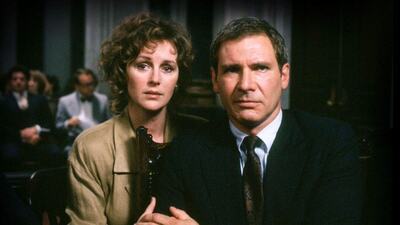It had been decades since I watched the movie—though positively reviewed, it’s hardly held up as a great film or even one of Ford’s finest moments—and revisiting it last week, I was struck by how wonderfully competent it was. That sounds snide, but I mean it sincerely: Over the course of two very watchable hours, I was sucked back into Rusty’s world as his life slowly falls apart, the supporting characters all appealing types and a few emerging stars popping up in the margins. (I had no memory Bradley Whitford was in “Presumed Innocent,” alongside his future “West Wing” costar John Spencer.)
Never especially revelatory but quietly compelling scene to scene, Pakula’s film features an understated Ford as a man so tragically bottled up that he seems incapable of expressing the profound anguish he feels—over the affair, over Carolyn’s death, over being accused of her murder, over the damage he’s done to his family, over his wife’s angry certainty that he’s still in love with the deceased. With Julia superb as Rusty’s crafty lawyer and Winfield expertly playing the unimpressed judge, “Presumed Innocent” feels like the work of old pros doing their thing. There’s a remarkable comfort to the film—the reliable enjoyment of a crackling story told well, complete with the prerequisite reveal of the killer during the third act through a melodramatic “This is why I did it” speech. “Presumed Innocent” is smooth, polished, efficient. Nothing more, nothing less.
When older moviegoers complain about how they don’t make ‘em like they used to, they’re talking about “Presumed Innocent” and other perfectly good, modestly budgeted dramas. Like Turow’s book, the film is high-toned escapism, decorated with handsome production values and good actors. If the film were a meal, it would be quality fast-casual, and soon, other blockbuster books made their way to the screen—specifically, the works of another attorney-turned-author, John Grisham. Morally nuanced erotic thrillers weren’t his thing, though, as films like “The Firm” and “A Time to Kill” were more traditional legal thrillers. Grisham wasn’t alone, though. Michael Crichton had a great 1990s, with Jurassic Park, Sphere, and Disclosure all being adapted. And on the strength of “The Hunt of Red October’s” success, author Tom Clancy saw a few other Jack Ryan books get turned into films, also starring Ford. Most of these page-turning adaptations were well-crafted flicks—solid doubles that weren’t trying to be home runs. Which is fine—not every movie needs to swing for the fences.

